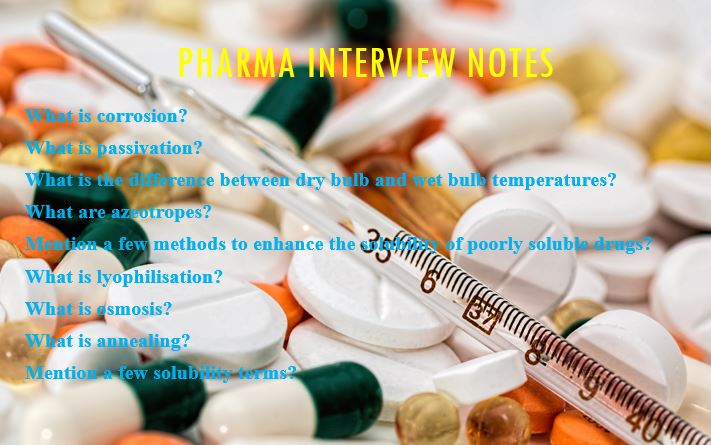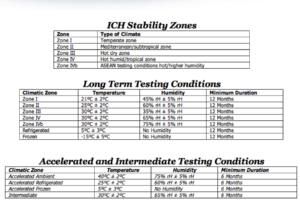Pharma interview notes:
We have already provided department wise pharma interview question and answers. Also provided qualifying exam papers for interview. Here we covered some more interview Q&A. these notes are also useful for interview. We are dedicated to provide some more interview questions as shown below in the near future. We also provide departmental wise interview notes continuously. Following Q&A are belongs to pharmaceutics which are useful for the production and R&D jobs.
What is corrosion?
It is a metal deterioration process. Due to chemical or chemical reactions or environmental interactions with surface metal, metal surface is gradually destructed. It is an unwanted process. Corrosion leads to machinery damage, product contamination and replacement of damaged machinery increase economic burden to the plant. Corrosion should be avoided by taking preventive measures.
What is passivation?
It is a procedure which makes the stainless steel more rust resistant by reducing the chemical reactivity of surface. Usually citric acid or nitric acid is used to do this process. It removes the free iron from the stainless steel surface. A protective oxide layer will be formed with inert in nature. This layer will less likely react with chemicals or air in the environment. If more layer is formed It will more resistant to corrosion less reactivity with chemicals.
What is the difference between dry bulb and wet bulb temperatures?
These are the temperatures useful to find the state of humid air.
The dry bulb temperature and wet bulb temperature is known as “air temperature” and “adiabatic saturation temperature” respectively.
Dry bulb temperature measured using a thermometer, bulb of the thermometer will be exposed freely in the air. While measuring the wet bulb temperature, bulb will be wrapped in a wet muslin cloth.
Pharma interview notes
What are azeotropes?
Azeotropes are also known as constant boiling mixtures. It is a mixture of liquids that act as a pure liquid having a constant boiling point. The boiling point may be higher or lower than individual component in the mixture’s boiling point. Azeotropes contains same composition of components in both liquid and vapour phase.
For eg:
water boiling temperature : 100 0C,
Ethanol boiling point : 78.3 0C
When a mixture of liquid composed 95% water and 5% ethanol by volume. This azeotrophic mixture will constantly boil at 78.2 0C. By using boiling method or simple distillation, we can not separate water and ethanol from this azeotrophic mixture.
If the mixture contains two liquids, is known as binary azeotropes. If it contains three liquids, it is known as ternary azeotropes.
Mention a few methods to enhance the solubility of poorly soluble drugs?
Various methods are used to enhance the drug solubility are as follows
– Particle size reduction
– Drug salt formation
– Solid dispersion
– Preparing Nano suspension
– Using surfactants
What is lyophilisation?
It is also known as freeze drying technique. In involves following steps
– Freezing: In this step, sterilised partially stoppered containers (drug+ excipients+ solvent) placed in the freeze drying chamber.
-Primary drying(Sublimation): To sublimate water, pressure is reduced and heat increased. Ice crystals directly converted to vapour bypassing the liquid state. 95% water removed in this phase.
-Secondary drying (Desorption): Remaining bounded water removed in this phase. Temperature is increased more than the primary drying temperature. Then the vacuum is broken and filled with inert gas and sealed.
This technique is used to preserve the biodegradable materials.

What is annealing?
Annealing is also known as slow freezing. When some compounds (ex. Amorphous compounds like mannitol) will not complete crystals. In this case, annealing is used. After forming the crystals, temperature is cycled. (Like -50 C to -30 C for few hours then back to -50 C). This process helps to form larger crystals.
What is osmosis?
It is a phenomenon. When dilute solution and concentrated solution separated by a semipermeable membrane. The solvent passes from dilute solution to concentrated solution. This pressure is known as osmotic pressure.
Any fluid is injected into the body should be isotonic in nature. If hypertonic fluid injected into the body, it crenation of blood cells. If hypotonic fluid injected into the body, solvent passes in to blood cells causes haemolysis.
Mention a few solubility terms?
Very soluble- 1 part of solute soluble in less than 1 part of solvent
Freely soluble -1 part of solute soluble in 1-10 parts of solvent
Soluble – 1 part of solute soluble in 10-30 parts of solvent
Sparingly soluble – 1 part of solute soluble in 30-100 parts of solvent
Slightly soluble – 1 part of solute soluble in 100 -1000 parts of solvent
Very slightly soluble – 1 part of solute soluble in 1000-10000 parts of solvent
Practically insoluble – 1 part of solute soluble in more than 10000 parts of solvent
Related: Clinical trials overview
If you feel these questions and answers helpful for your interview ,please share .
